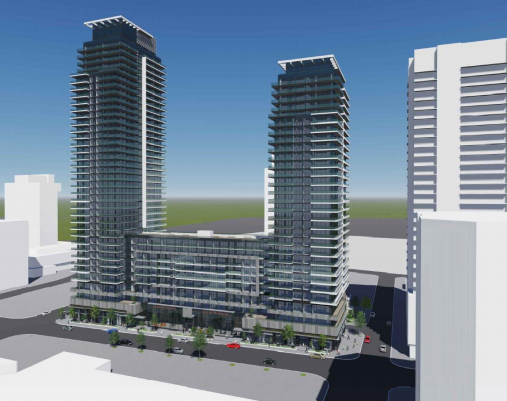Questions were raised at a city committee Monday over whether London taxpayers should cover the cost of cleaning up contaminated soil at a major downtown development.

Rygar Properties Inc. had requested a $2.7-million grant through the city’s brownfield clean-up fund.
READ MORE: London approves plan to build protected bike lanes downtown
The developer, which is set to erect a nine-storey, a 29-storey, and a 38-storey building on Talbot Street, said last fall the site contained contaminated soil. The total cost of the project is $300 million.
However, councillors questioned the request since Rygar plans to build a four-storey parking garage, meaning the soil would be excavated regardless.
“If you have to build a big building with four levels of underground parking, you have to dig up this dirt and take it away anyway,” said Coun. Jesse Helmer.
“I think what we should be paying for is the incremental cost difference between doing that on a clean site and doing that on a contaminated site.”
The committee voted 5-0 in favour of the city covering the cost of the difference between the clean and contaminated soil.
READ MORE: Bus rapid transit in hot seat for London civic works committee meeting
Coun. Stephen Turner said he felt the development would go ahead regardless of whether the cleanup grant was approved.
- Some 2019 candidates ‘appeared willing’ to engage with foreign interference: Hogue inquiry
- Princess Anne to help commission new navy vessel in B.C. ceremony
- Foreign interference ‘undermined’ public confidence in elections: inquiry
- Canada, Manitoba to develop Red Dress Alert for missing Indigenous women and girls
“On its own, without this referral back, I would vote against the application,” he said. “There’s all evidence that this building was proceeding, regardless of the site condition.”
The issue will now go before city council next week.
The Rygar project drew the ire of heritage activists in London as approval of the plans meant a row of Victorian-style townhouses on Talbot Street, known as Camden Terrace, would be demolished.
The 700-unit project is expected to bring in $5 million in property taxes annually once it’s built.
It would also generate $10 million in development charges for the city, however, those will be covered by the taxpayer and not Rygar.








Comments